‘I hope I can say I have fought the good fight’: Tory stalwart Don Plett retires
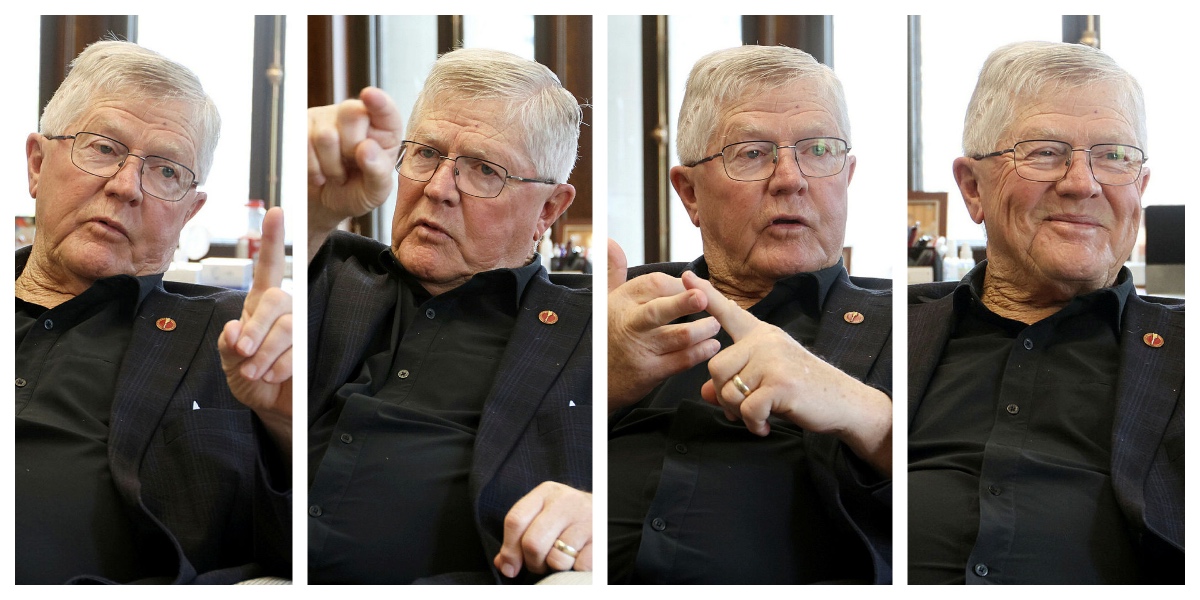
The Conservative Party’s founding president, Manitoba senator Don Plett, has officially exited the Red Chamber, and after a disappointing election, he’s urging federal and provincial conservative “cousins” to put down their knives, and pick up olive branches to maintain the unity he and others worked for years to build and maintain.
“You cannot have conservatives airing their laundry the way ours was aired during the federal campaign. It’s wrong, shouldn’t have happened, and we have to put that aside,” said Plett, who sat down with The Hill Times in his third-floor office in the Senate of Canada Building on May 7—one week out from his 75th birthday and mandatory retirement on May 14.
Though the 45th Parliament has yet to begin, Plett got permission and support from the Senate Speaker to give a farewell speech in the Red Chamber on May 1 after missing out on the usual goodbye due to prorogation and the subsequent election.
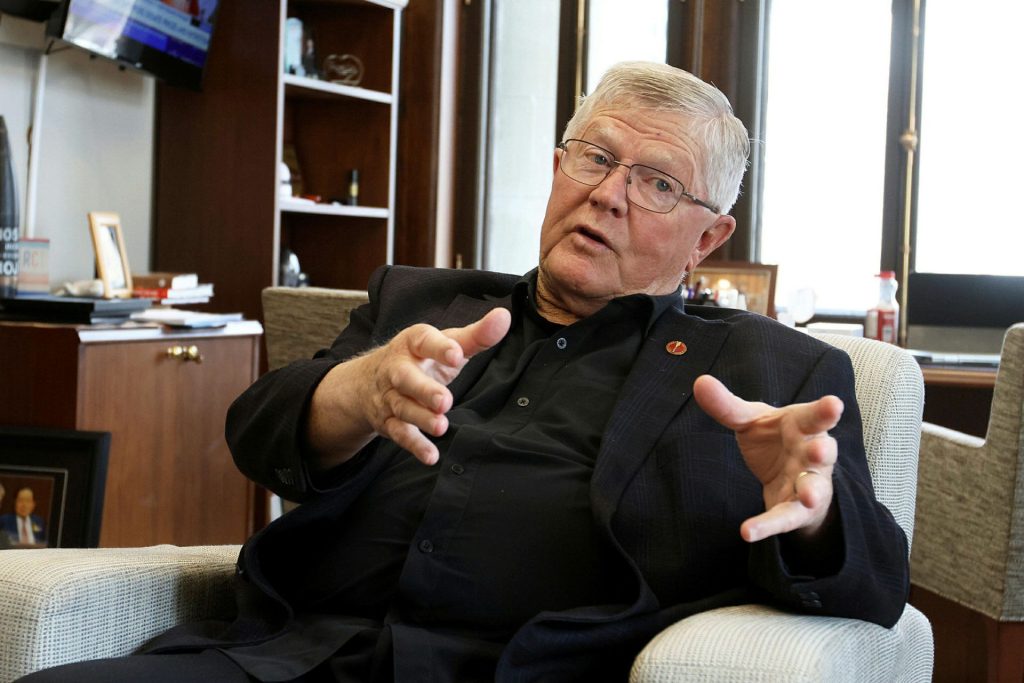
Plett caught the political bug young.
Raised in Landmark, Man.—a small town at the geographical centre of Canada—Plett was shaped by his “very conservative” hometown, and his politically active dad, Archie. During the 1965 federal election, Plett’s father was part of then-Progressive Conservative candidate Jake Epp’s campaign. Tasked with organizing scrutineers and get-out-the-vote activities at a number of polling stations, Archie voluntold his son to lend a hand as a scrutineer. “I enjoyed it. I got to meet Jake, started following him a bit in politics, became very good friends, and just kind of caught the bug,” Plett recalled.
Plett started working at the heating and plumbing business started by his father at just seven years old, and at 16, he dropped out of high school to work full time—later returning to schooling, and graduating from Red River College. Plett married young—he was 18 years old, and his now-wife, Betty, 17—and by 1987, he officially took over his father’s business.
At the same time, he remained active in politics as a Progressive Conservative supporter, and came to believe in the need to unite right-of-centre parties. That belief lured him to the Canadian Alliance at the turn of the millennium; Plett helped recruit future cabinet minister Vic Toews to run for the fledgling party in his home riding of Provencher, Man., and managed Toews’ successful 2000 federal campaign. Despite that victory, Plett said the experience left him frustrated with the way the national campaign had been run, and the way the party was “completely controlled from the West where it seemed that if you ran a mailbox under a conservative banner, you could win.” By 2002, that “frustration and anger” led him to run for a national council seat.
Plett was elected to council the same day Stephen Harper was chosen to take the party’s helm. The two met for the first time at their inaugural council meeting, at which—through discussion of problems involving a “chosen candidate” and “some misappropriation of funds”—Plett said he “made a bit of an impact” on the future prime minister. Not long after, the post of party president opened up, and Harper encouraged Plett to seek the job.
Less than a year into Plett’s term, merger talks began between the Canadian Alliance and Progressive Conservatives, and Plett ended up travelling coast to coast to meet with riding associations to get them onside—an experience Plett now considers a “career highlight.” Having previously been a staunch “Brian Mulroney conservative,” Plett said he could speak to both sides of the burgeoning political family, and “was able to sell it a little easier than some others might have.”
It was a merger many resisted. Challenged by some, Plett said his “answer was always the same: you cannot win an election if you’re going to base everything only on what you believe. If you’re not going to be an open tent, and you’re not going to accept other peoples’ opinions, you will not ever win government. And you will never implement change from opposition benches.”
“Those weren’t all easy times, I’ll tell you,” recalled Plett. “There were a lot of hardcore [people]—probably more on the Progressive Conservative side than on the Reform side, but not entirely—that didn’t speak to me for years because they said I had broken up a family, which is what political parties are.”
The merger, of course, went ahead, and Plett was elected as the federal Conservative Party’s first-ever interim, and later permanent, president. He ultimately served for six years, ending in 2009.
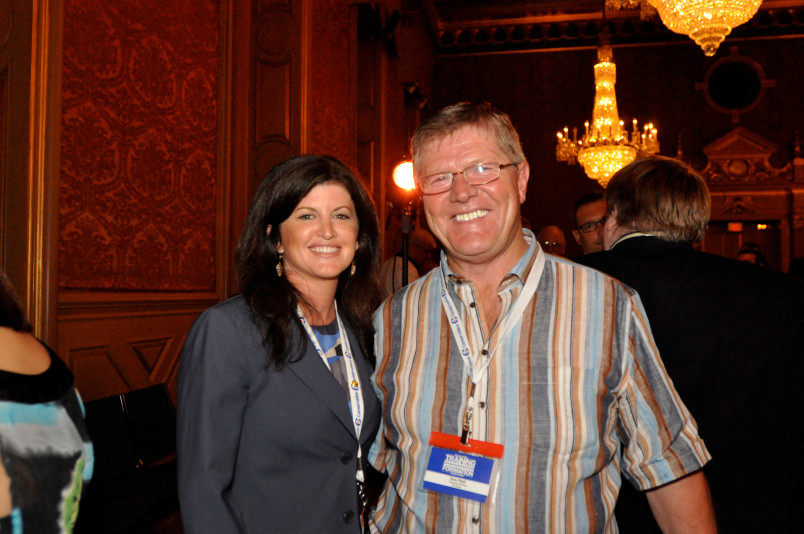
Plett said he and Harper—who had led the party to government in 2006 and become prime minister—had talked on and off over the years about his next steps, including possible appointments. Harper had resisted making Senate appointments in his early years as PM, but had begun naming Senators by the end of 2008. And so, when a seat opened up in Manitoba the next year, Harper once again broached the subject.
“His words basically were, ‘I need you and people like you in the Senate to move the Conservative agenda forward.’ And I said, ‘I am there to work at your pleasure,’” recalled Plett.
What to do about the Senate?
Plett said his introduction to the Red Chamber was eased by the fact that, during their years helming the Alliance Party, Harper had made Plett a member of caucus, making him already “reasonably familiar” with the ins and outs of Parliament Hill.
At the time, Harper—a proponent of Triple-E (elected, equal, and effective) Senate reform—was pushing to make changes to the Upper Chamber.
Plett is not a Triple-E proponent, and is against the idea of an elected Senate. “If we had Senate elections, then our Chamber would be the same as [the House],” rather than one of “sober second thought,” he said.
Plett said he also personally didn’t agree with the eight- and later nine-year term limits Harper sought to impose—ultimately unsuccessfully—on Senators, but out of respect for the prime minister and the party cause, he publicly toed the line.
He told The Hill Times he had his own ideas for reform: 15-year term limits, and no appointees younger than 50 years old in part to ensure those offering that sober second thought had “some life skills” and experiences to bring to the table.
While Harper’s attempts at reform failed, then-Liberal prime minister Justin Trudeau was able to force the biggest changes yet on the institution by removing Senators from the Liberal caucus in 2014, and introducing a new appointment process overseen by an independent advisory board after forming government in 2015.
The changes subsequently ushered in as part of the Senate’s modernization—as its proponents prefer to describe it—are ones Plett has consistently and unabashedly opposed. In his view, they’ve weakened the institution, and turned it into an “echo chamber.”
The same changes touted as positives by some—the formation of new groups, the severing of caucus ties, and the proliferation of Senate public bills—are ones Plett has railed against, including in his recent farewell speech in which he urged new Prime Minister Mark Carney (Nepean, Ont.) to consider change, including returning to having Senate “groups linked to MPs’ caucuses.”
“These ties could be strong or loose, but if it ceases to be part of the [partisan] political debate, the Senate will become a private club of 105 individuals who debate in the abstract or are focusing on their personal projects,” Plett said in the Chamber on May 1.
In his view, including Senators in caucus gives them more say, and offers a wider net of perspectives in the drafting of legislation. It also ties them to a party which gets judged at the polls by the electorate.
Plett has questioned the justification for the multiple Senate groups that have formed since 2015, each of which receive extra resources to support their respective leadership teams—“if you’re independent, why do you need three groups?”—and doesn’t see the jump in bills tabled by individual Senators (known as public bills) as a positive. In his view, the unelected Senate is not “here to develop our own policies.”
“We are here to implement government policy, to debate, to hold the government’s feet to the fire,” he told The Hill Times.
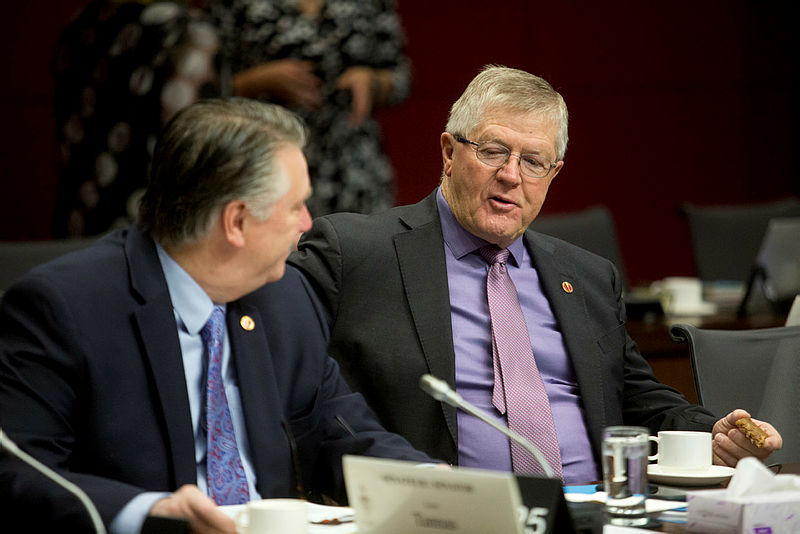
Asked how hopeful he is that the new PM will take up his suggestions, Plett said a Carney cabinet minister told him dealing with the new Senate is “like herding cats.” Plett suggested Carney could decide to take a page out of former Liberal PM Paul Martin’s book, and recognize the need for “an organized opposition as well as an organized government,” referencing Martin’s decision to appoint conservatives to the Chamber “to make sure they had their numbers up.”
Regardless of his criticisms, Plett said every Senator in the Chamber today is equally legitimate, and he respects colleagues across the aisle.
Never one to mince his words, Plett’s approach has at times rankled other Senators, and been the source of complaints.
A devout born-again Christian, Plett said he’s “tried, and certainly not always succeeded” to live by the principles with which he was raised: “to be passionate about what I do, to respect others, to respect their opinions,” and to accept people for who they are, not what they do.
“I am passionate. I played a lot of sports. I got my elbows up in the corner, I used my stick where I had to … but when the game was over, I went with the opposition and had a beer,” he continued. “I hope I can say I have fought the good fight, and I have kept the faith.”
That elbows-up approach is one Plett said is “much more difficult” in the new Senate, but he nonetheless counts some Senators across the aisle as friends, just as he did during its bipartisan days.
“My best friend in this Chamber for many years was a senator by the name of Terry Mercer. … He was [formerly] the executive director of the Liberal Party; I was the president of the Conservative Party. I don’t think we ever said a kind word to each other in the Chamber,” said Plett, but “Mercer understood that if I attacked him, I wasn’t attacking Terry Mercer. I was attacking the Liberal Party.”
Over the years, Plett has sat on a number of Senate committees—including its agriculture committee, which he described as his “favourite,” and the executive Senate Internal Economy Committee—and served as opposition whip from 2015 to 2019, and since then as leader of the opposition in the Senate.
Asked which bill or study stands out most from his career, Plett pointed to his own public bill, the Canada Prompt Payment Act, which addressed invoicing from and payment to federal government contractors. “As much as I complained earlier about all the private members’ bills,” that’s “one of the bills I’m most proud of,” he said.
The bill cleared the Senate but died on the Order Paper with the end of the 42nd Parliament; its reforms were reintroduced through government legislation last Parliament, which Plett worked with Liberals to help get passed in 2023.
More olive branches, fewer knives
Plett said he had “high hopes” for the Conservative Party heading into this year’s election—and that a new prime minister, Pierre Poilievre, would make the changes he sees as needed to the Senate.
Despite the disappointment of the party’s ultimate loss—with the Carney Liberals re-elected to lead a strong minority Parliament—Plett remains a steadfast supporter of Poilievre and his leadership. And while he thinks a “new approach” is needed, “we definitely do not need new leadership,” but “maybe change part of the background team.”
“We’ve had too many leaders in the last while, and we need to put that type of stuff aside,” said Plett.
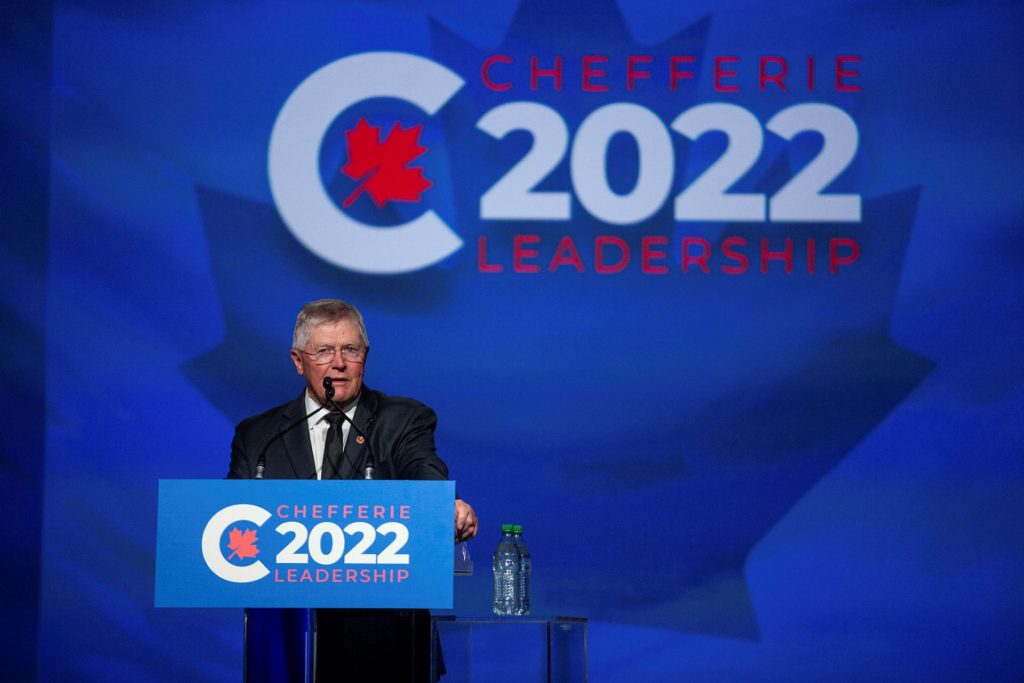
Amid failing fortunes, the 2025 campaign saw barbed words traded between current and former party organizers, and federal Conservatives and their provincial counterparts in Ontario and Nova Scotia in particular.
After working to maintain the party’s hard-won unity as president during the Conservatives’ first six years of existence, Plett is once again urging the need for unity, and reconciliation.
“I was not happy with the split that we had. I think other conservative leaders should have done one of two things: they should have either stayed out of the way completely, or they should have supported fellow conservatives. I think, federally, we should have done the same thing in their [provincial] elections,” said Plett. Instead, “around the country, we have been fighting with our cousins.”
“We have to put that aside. Pierre Poilievre is a person that can put it aside; he’s done it in the past, he can do it again, but we [at both levels] have to make sure that we do not wait for the other person to put out the olive branch.”
Plett credited Poilievre for reuniting the federal flock, and neutering the People’s Party of Canada threat after the cracks that formed following Harper’s 2011 exit from the party leadership.
Plett said he plans to “truly, 100 per cent” retire—at least for the next year, which he plans to spend travelling, playing golf, and visiting with his grandchildren. “We’ll see what happens after that.”
On May 6, Conservative Senator Leo Housakos (Wellington, Que.) was acclaimed to succeed Plett as Senate leader as of May 14.
The Hill Times






 LICENSING
LICENSING PODCAST
PODCAST ALERTS
ALERTS













